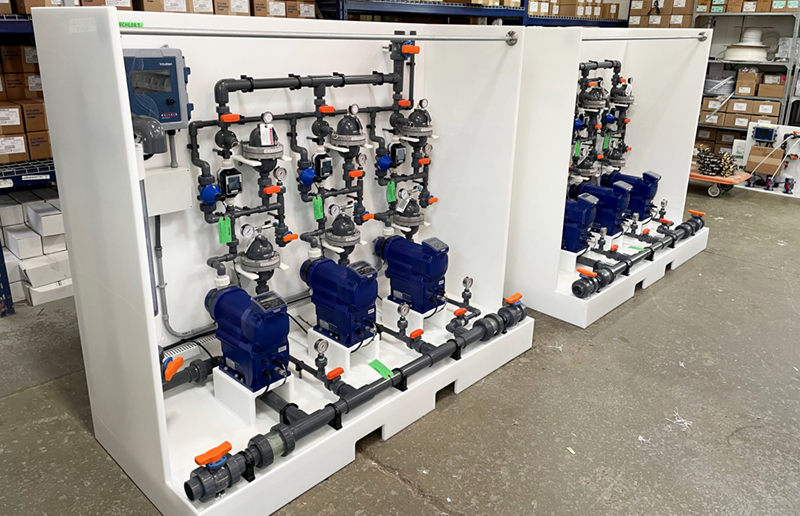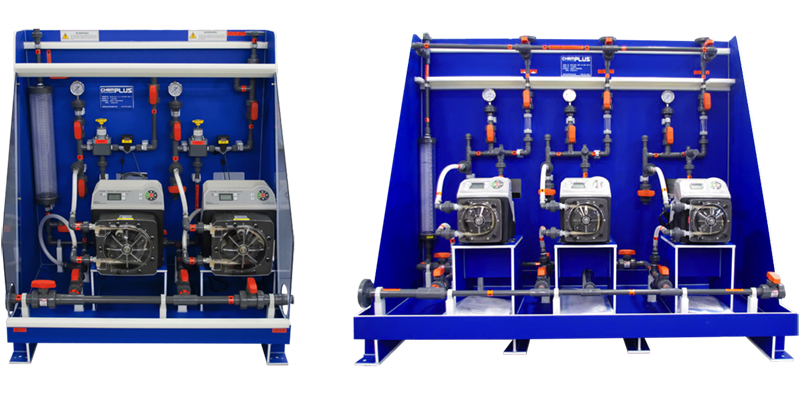Think about cooking for a second. Salt specifically...a pinch here, a dash there—too little and it's bland, too much and it's ruined. That's exactly what chemical feed injection skids do for fluid process systems, except instead of seasoning, we're talking about precise chemical dosing that can make or break million-dollar operations. Whether you're purifying drinking water, processing oil, or running a manufacturing plant, getting the chemistry right isn't just important—it's everything. This is what makes precise chemical injection so essential to keeping your system running.
These skids might not be the most glamorous piece of industrial equipment, but they're changing the game in ways that really matter. They make operations safer, more efficient, and more reliable. And these days, that makes a world of difference.
Interested in learning more about these systems? Sign up for an exclusive live event from Blacoh, co-hosted with Burt Process, where we'll explore best practices, system optimization, and how to select the right components for your application.
What Exactly IS a Chemical Injection Skid?
A chemical feed injection skid integrates pumping, measurement, and control systems into a unified platform for precise chemical delivery. These engineered systems ensure accurate dosing, safe chemical handling, and reliable operation in applications ranging from water treatment to petrochemical processing.

Chemical feed injection skids featuring Blacoh dampeners.
Think of it this way: in a world where precision, safety, and efficiency aren't just nice-to-haves but absolute must-haves, these systems aren't just tools—they're insurance policies for your entire operation. And that's something worth getting excited about, even if the name doesn't exactly roll off the tongue.
Technical Advantages and System Benefits
The primary technical advantages of chemical injection skids lie in their precision control and automated operation; and in many cases come as pre-engineered for plug-n-play installations. These systems maintain strict tolerances in chemical dosing, ensuring optimal process efficiency and consistent product quality. Advanced monitoring capabilities provide real-time data on flow rates, pressure levels, and chemical consumption, enabling proactive maintenance and system optimization.
Why Use Chemical Feed Injection Skids?
- Operational Excellence
Think of these skids as "autopilot" for chemical processes. They're constantly monitoring, adjusting, and fine-tuning operations without breaking a sweat. While traditional manual systems require constant babysitting, these systems handle everything automatically. They'll adjust chemical flow rates on the fly, meter out substances with incredible precision, and even call you if something looks off.
- Safety & Compliance
In an age where environmental regulations are tighter than a drum and worker safety is paramount, these systems are worth their weight in gold. They keep dangerous chemicals safely contained and personnel at a safe distance. If there's ever a leak, they'll detect it faster than you can say "OSHA compliance" and shut everything down before it becomes a problem. Plus, they keep meticulous records of every drop of chemical used (something your friendly neighborhood regulator will absolutely love).
- Economic Implications
"But what about the cost?" I hear you ask. Yes, installing these systems comes with a price tag. But here's the thing: they pay for themselves faster than you think. They're incredibly precise with chemical dosing (no more waste of expensive chemicals), they need way less manpower to operate (goodbye, overtime costs and save with energy efficiency), and they break down less often than traditional systems.
- Applications Across Industries
These systems are showing up everywhere, and for good reason. Water treatment plants use them to keep our drinking water safe and clean. Oil and gas companies rely on them to keep their operations running smoothly and prevent pipeline corrosion. Even manufacturing facilities are getting in on the action, using them for everything from process control to equipment maintenance.
Things to Keep In Mind
If you're just getting into the world of chemical feed injection skids, there's a lot to think about:
First up, process requirements. You have to make sure the chemicals are compatible, check the flow rate specs, and keep an eye on pressure requirements. Don't forget about how it's all going to mesh with your control system, too.
Then, consider the facility parameters. Do you have enough space to fit this thing? What's the power situation like? And let's not overlook the environmental conditions and how you'll get to it for maintenance. (No one wants to be bent like a pretzel trying to service equipment).
When it comes to picking the right skid, system selection criteria are crucial. As a quick recap, you'll need to know the specific injection rates, the pressure conditions of your process, and ensure the chemicals are playing nice with each other. Pay attention to control system specs, consider environmental factors, and, of course, stay compliant with all those pesky regulations.

Chemical feed injection skids as seen on the Burt Process website.
Looking Ahead
The future of chemical feed injection skids is pretty exciting. As industrial processes get more automated, these systems are keeping pace. We're talking smart monitoring, predictive maintenance, enhanced data analytics, and even remote operation capabilities. It's all about making things more efficient and reliable.
Chemical feed injection skids represent a critical advancement in industrial chemical management. Their implementation offers significant advantages in safety, efficiency, and operational control. While the initial investment may be substantial, the long-term benefits in operational efficiency, safety compliance, and process reliability make these systems indispensable in modern industrial operations.
Take the Next Step
While Blacoh Industries doesn't manufacture complete chemical feed injection skids, we specialize in creating the high-performance components that make these systems truly excel. Our pulsation dampeners, surge suppressors, and calibration columns are trusted industry-wide for their reliability and precision in chemical feed applications.
Want to build your own optimized chemical feed system? Partner with your local distributor and specifically request Blacoh components. Your distributor can help design and assemble a custom skid that meets your exact specifications while incorporating our field-proven technology.
Ready to dive deeper into chemical feed systems? Join us for that exclusive live event co-hosted with Burt Process. Register now to learn from industry experts and get your specific questions answered.